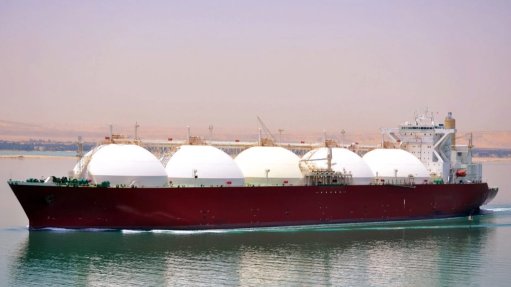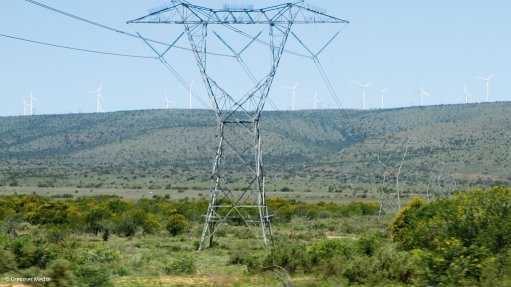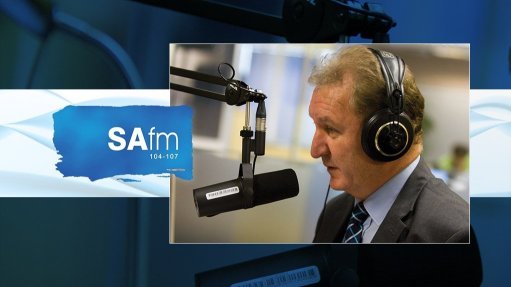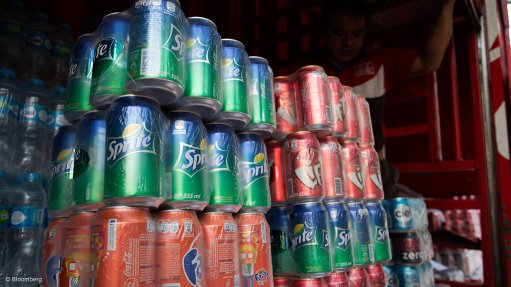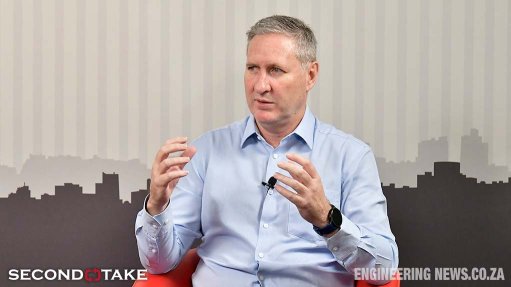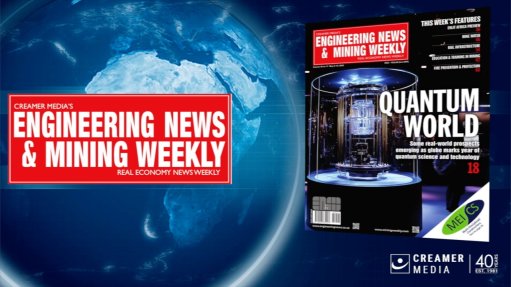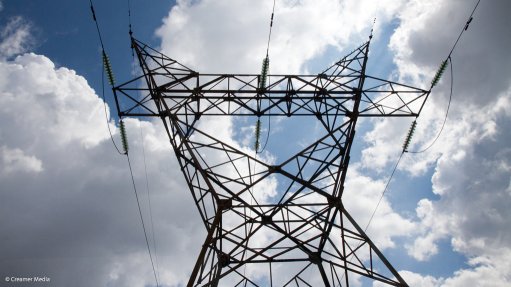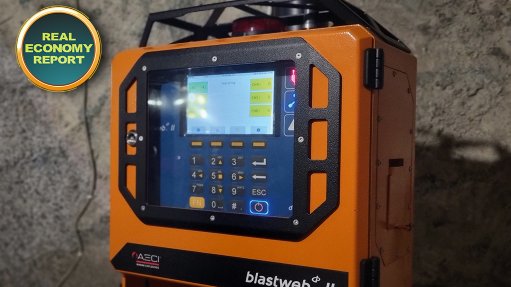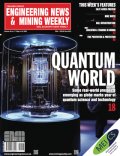SpaceX happy because of data collected from abortive first test flight of its super rocket

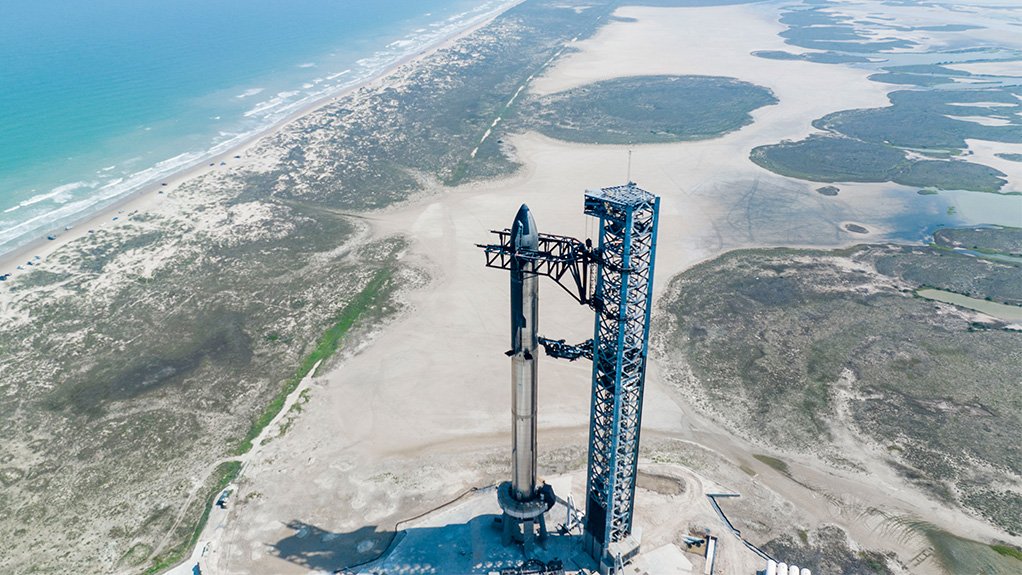
The Starship/Super Heavy rocket stack on the SpaceX launch pad, before the first test flight
Photo by SpaceX
Thursday saw the first attempt by US space launch company SpaceX, founded by South African-born engineer and entrepreneur Elon Musk, to launch its unprecendentedly powerful Starship/Super Heavy spacecraft/rocket combination. This initial test flight was flown from the company’s test base at Boca Chica in the US State of Texas.
The rocket cleared the launchpad and flew for nearly three minutes before suffering a major malfunction, which caused it to tumble out of control. The company’s flight controllers then activated the self-destruct systems (officially called ‘flight termination systems’) of both the Super Heavy rocket and the Starship spacecraft, for safety reasons.
The Super Heavy (that is indeed its name) rocket is powered by no fewer than 33 liquid-fuelled engines, designated Raptor by SpaceX. These were developed in-house by the company. Another six Raptors power the Starship. During this first flight of the Super Heavy, at 15 seconds into the flight, three of its engines were not working. A fourth shut down at 40 seconds into the flight. This number increased to six by 100 seconds into the flight, but then one was restarted, reducing the number of non-functioning engines to five.
At two minutes forty-nine seconds into the flight, the Super Heavy’s engines were meant to shut down, and then the Starship was meant to separate from the launch rocket and ignite its own engines. None of this happened. Instead, the still-intact “stack”, with the Super Heavy engines still running, tumbled out of control and had to be destroyed. The rocket had reached an altitude of 39 km.
Before the launch, SpaceX warned that the prime purpose of the flight was to collect data, not to actually get into space. That data would be used to improve the design of the rocket. The mission certainly succeeded in terms of collecting lots of invaluable data.
It also won plaudits from the US National Aeronautics and Space Administration (Nasa), which is one of SpaceX’s most important customers, if not the most important one. “Congrats to @SpaceX on Starship’s first integrated flight test!” tweeted Nasa administrator Bill Nelson. “Every great achievement throughout history has demanded some level of calculated risk, because with great risk comes great reward. Looking forward to all that SpaceX learns, to the next flight-test – and beyond.”
Musk also reacted on social media. “Congrats @SpaceX team on an exciting test launch of Starship!” he tweeted. “Learned a lot for next test launch in a few months.”
“With a test like this, success comes from what we learn, and we learned a tremendous amount about the vehicle and ground systems today that will help us improve on future flights of Starship,” affirmed the company in a statement.
While world’s current most powerful launch rocket, the Space Launch System employed by Nasa, can left a maximum payload of 95 t into low Earth orbit, the Super Heavy/Starship combination, once operational, would be able to lift 150 t. And both Super Heavy and Starship are planned to be reusable. The ability to lift so much on a single flight, plus the reusability of the launch system, would revolutionise the economics of access to space by massively reducing launch costs.
Comments
Announcements
What's On
Subscribe to improve your user experience...
Option 1 (equivalent of R125 a month):
Receive a weekly copy of Creamer Media's Engineering News & Mining Weekly magazine
(print copy for those in South Africa and e-magazine for those outside of South Africa)
Receive daily email newsletters
Access to full search results
Access archive of magazine back copies
Access to Projects in Progress
Access to ONE Research Report of your choice in PDF format
Option 2 (equivalent of R375 a month):
All benefits from Option 1
PLUS
Access to Creamer Media's Research Channel Africa for ALL Research Reports, in PDF format, on various industrial and mining sectors
including Electricity; Water; Energy Transition; Hydrogen; Roads, Rail and Ports; Coal; Gold; Platinum; Battery Metals; etc.
Already a subscriber?
Forgotten your password?
Receive weekly copy of Creamer Media's Engineering News & Mining Weekly magazine (print copy for those in South Africa and e-magazine for those outside of South Africa)
➕
Recieve daily email newsletters
➕
Access to full search results
➕
Access archive of magazine back copies
➕
Access to Projects in Progress
➕
Access to ONE Research Report of your choice in PDF format
RESEARCH CHANNEL AFRICA
R4500 (equivalent of R375 a month)
SUBSCRIBEAll benefits from Option 1
➕
Access to Creamer Media's Research Channel Africa for ALL Research Reports on various industrial and mining sectors, in PDF format, including on:
Electricity
➕
Water
➕
Energy Transition
➕
Hydrogen
➕
Roads, Rail and Ports
➕
Coal
➕
Gold
➕
Platinum
➕
Battery Metals
➕
etc.
Receive all benefits from Option 1 or Option 2 delivered to numerous people at your company
➕
Multiple User names and Passwords for simultaneous log-ins
➕
Intranet integration access to all in your organisation






